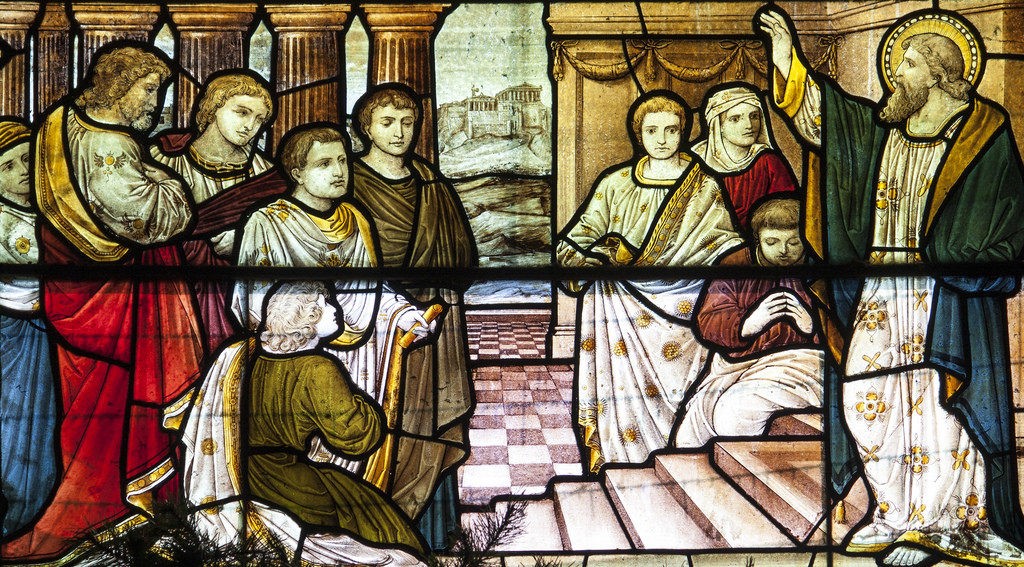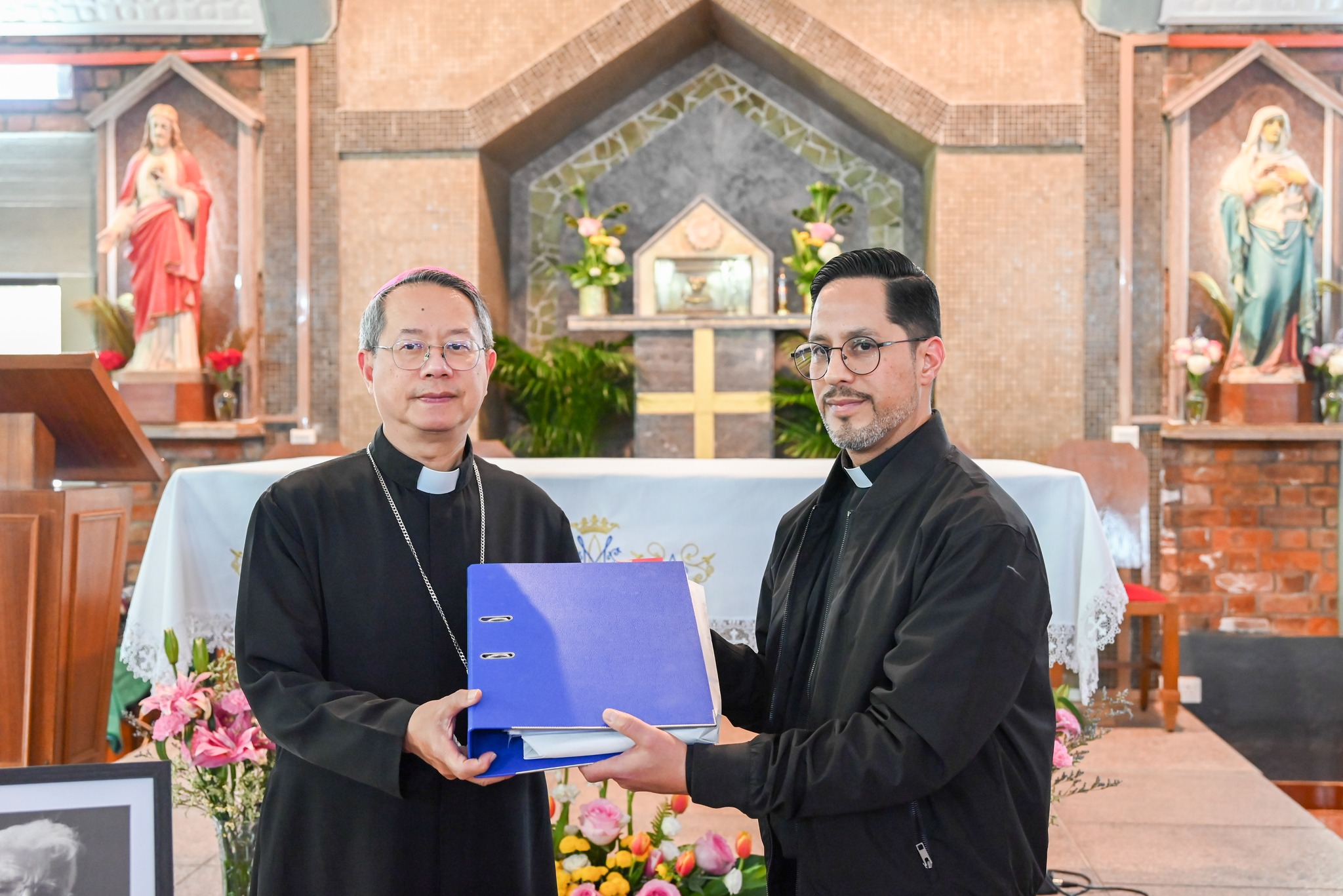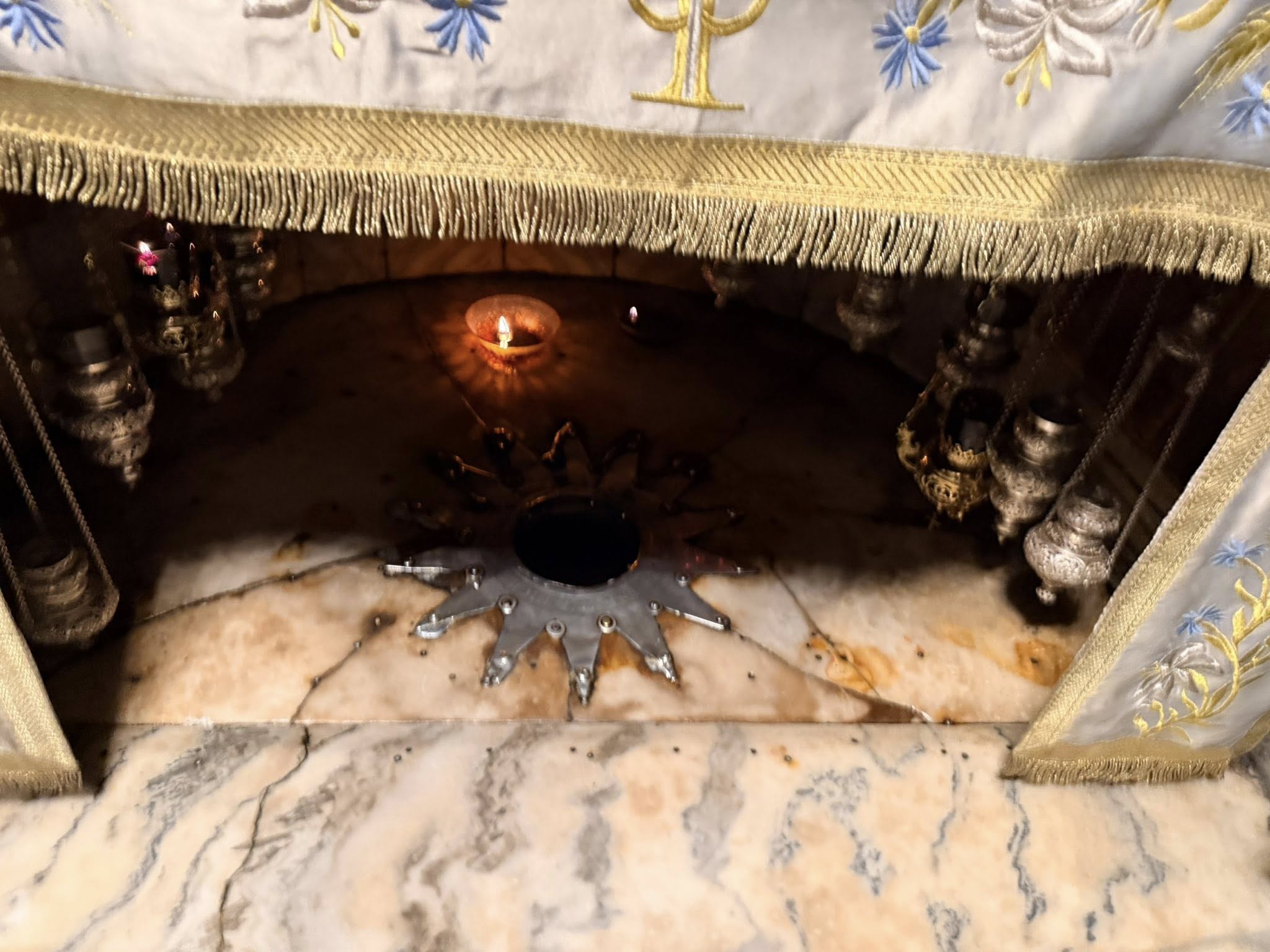– Fr Francis Elsinger
THE TRUE CHURCH
In the Feast of St Mark, we sing, “Through the gospel, God called us to faith in the truth so that we might share the glory of our Lord Jesus Christ Alleluia.”
Our Catholic religion is a revealed religion (cf Eph 3:5, Rev 1:1, 1 Cor 2:10, Rom 16:25, Ez 20:10-11; CCC no 35, 50, etc.) God has taken the initiative not only in creating us human beings, as well as every creature that exists, He has also taken the initiative in instructing us about our proper relationship with God, that is, the proper use of our free will, because Adam and Eve brought sin into our human world. This is the purpose of Holy Scripture. St Paul in 1 Thess 2:13 writes, “Another reason why we continually thank God for you is that as soon as you heard the Word we brought you as God’s message, you welcomed it for what it truly is, not the word of any human being, but God’s Word.” As Catholics we must believe that the whole of Sacred Scripture is indeed God’s Word and “not the word of any human being” (CCC 105 ).
Therefore, the modern day error of changing Sacred Scripture to make it more understandable is indeed a grave error. This includes the “twisting” of God’s Word in a humanly clever way to mean something other than our traditional Catholic understanding. We need to constantly pray for the first Gift of the Holy Spirit, Fear of God (cf Ps 111:10, Sirach 1:11-20, Proverbs 1:7; 9:10; also CCC 1299; 1831; 1845, etc.). In the English language this “fear” is understood as “reverence”, reverence for God’s Word, not only in Sacred Scripture, but for every truth of our traditional Catholic Faith.
Another appropriate word is “venerate” (cf CCC 141). If anyone truly venerates the Word of God, he will not seek to change it. We have been given the Faith by the Holy Spirit to believe the Word of God. If we humbly believe in God’s Word, then we will wait for the Holy Spirit to enlighten us as to the deeper meaning of God’s Word, not only once but many times. This is because every word in Scripture is an expression of God’s Love, which is mystery. Mystery by definition, cannot be understood by our rational mind, so we wait for enlightenment preferably in Spirit-led humble prayer that ends in silence! (cf Jn 14:26; also the Prayer of Church, 7th Week of Easter, Tuesday, Office of Readings, second reading from St Basil).
Unfortunately, most professors of Sacred Scripture and theology teach rational theology. This has its limited value, but the limitations on its value are not taught as well! This is because they are not understood. On the feast of St Catherine of Siena, the Church gives us a beautiful example of genuine Theology (knowledge of God). In the Office of Readings, the second reading is an extract from the saint’s dialogue On Divine Providence. It is the Saint speaking to God, but demonstrates why the Pope proclaimed her Doctor of the Church.
In this regard let us look at Mt 13:10-16 where the disciples ask Jesus why He always spoke in parables when instructing the people. Basically, a parable needs our intuition to be understood. If we use our rational mind to analyze a parable, then we put ourselves in the hopeless category! At Jesus’ time on earth, most Israelites were looking for a Messiah who would conquer and rule the world. Today we have too many in our Church hierarchy who over-emphasize the social teachings of the Church. Even before Vatican II the theology taught in some seminaries taught that the main mission of the Catholic Church was to “change the world,” and not just “save souls.” Jesus was sent by the Father to this earth to save us from our sins! We need to not only acknowledge our sins, but we need to repent and ask Jesus to forgive us in order to be saved. For Catholics we need to follow the traditional practice of frequent Confession. Confession includes the firm purpose of amendment in order to be a valid Sacrament.
In the Nicene Creed we pray: “I believe in one, holy, catholic and apostolic Church.” In Gospel of St John 12:44-50, which is the Gospel for Wednesday the third week of Easter, Jesus tells us very clearly that He says only what the Father wants Him to say. Thus, to change the Word of Jesus, or twist it in any way, is to act act against the will of God! It is a violation of the First Commandment.
TRUE OBEDIENCE
On Thursday the second week of Easter, the first reading is from Acts 5 and tells us, “Obedience to God comes before obedience to men.”
This is Sacred Scripture and is part of our Liturgy and should be understood as God’s Word given to us today!
And again on the Fifth Sunday of Easter, the first reading from Acts 6:1-7 tells us, “So the Twelve called a full meeting of the disciples and addressed them, ‘It would not be right for us to neglect the Word of God so as to give out food … (we will) continue to devote ourselves to prayer and to the service of the Word’.” This statement clearly shows the value system of the apostles in the beginning: they were in service to the Word of God.
The Bishops in the Church are the successors of the apostles in so far as they have the same purpose.
Eucharistic Prayer 1 in praying for “…Your Holy Catholic Church,” after naming both the current Pope and local Bishop, adds, “all those who, holding to the truth, hand on the Catholic and Apostolic Faith.” The presumption is, of course, that the Pope and all Bishops in union with him are amongst those who “hold to the truth and hand on the Catholic and Apostolic Faith.”
But if there is clear and indisputable evidence that any Church official, whatever his or her rank, is not “holding to the truth,” then we owe our obedience to God and not to man (cf Acts 5:29).
Ps 118(119), v 9 puts true obedience even more simply by asking the question: “How shall the young remain sinless? By obeying Your Word.” Our Catholic Faith should give us this certainty. How does anyone remain sinless? It is only by truly wanting and then actually obeying the Word of God. No matter who you are — Pope, Cardinal, Bishop, priest or lay person, it is the same.
TRUE PROPHECY
In the Old Testament in the section containing the books of the Prophets, we find God Himself speaking in the first person. For instance, Is 1:2: “Listen, you heavens; earth, attend, for Yahweh is speaking.” Or Jer 1:4, “The word of Yahweh came to me, saying: ‘Before I formed you in the womb I knew you.’”
In order to understand the Gift of Prophecy properly we need to reaffirm some basic truths of our Catholic Faith. St Paul assures us that in God we live and move and have our being (Acts 17:28). So when God chooses Moses or Jeremiah or St John the Evangelist or St Catherine of Siena or St Sr Faustina as a Prophet, God chooses the whole person. A person is not a machine, a tape recorder or a sophisticated computer. Jesus says He has chosen us, not the other way around.
So when God, Father, Son, or Holy Spirit (the Holy Spirit can and often does speak through our Blessed Mother , or some saint) choose a particular person, they choose the person’s language and culture as well, because everything about that person is “in God.”
That is why God speaking through different people uses different words to express the same truths.
April 29 is the Feast of St Catherine of Siena. She was designated as a Doctor of the Church in 1970 by Pope Paul VI. She had many gifts from the Lord, but the Gift of Prophecy is not mentioned, strangely, in any place that I can find in our current liturgical books. What evidence is there for saying that? In the Office (the official Prayer of the Church) of Readings for the 30th week in Ordinary Time the second reading begins this way: “With a look of mercy that revealed His indescribable kindness, God the Father spoke to Catherine: ‘Beloved daughter, everything I give to man comes from the love and care I have for him.’”
God the Father is obviously speaking to us today through St Catherine. This is the Gift of Prophecy in our Catholic Church. But it is not called prophecy for some strange reason! As a result some Scripture scholars deny the existence of the Gift of Prophecy in our New Testament Church. I suspect that whoever writes the introductions to our liturgical feasts don’t dare use proper scriptural terms out of deference for the experts. As a result of false teaching most priests and Bishops misunderstand the passage from Hebrews. (Hew 1:1-2), putting all prophets and prophecy in the past. Has any Pope speaking ex cathedra ever declared that the Gift of Prophecy ended with the death of St John the Apostle? So the opinion that the Gift of Prophecy ended with primary revelation is just an opinion and nothing more.
TRUE DIVINE INTERVENTION
From the beginning of our Catholic Church history, Jesus has demonstrated that “our” church is indeed his Church. Any deviation from Jesus and His Gospel teaching is heresy. An essential part of our New Testament is the changing of the persecutor Saul into the Apostle Paul. And this was done by Jesus Himself independently of the Apostolic Church which Jesus himself had just established!
Let’s look at the whole Bible. Abraham is called the Father of Faith, because he believed in God’s Word to him. And his Faith was tested time and time again by God.
The mission given to Moses is a clear case of Divine Intervention not just once but many times. The burning bush where God reveals His Name, I AM, the Ten Commandments, the water from the rock, to name just a few instances where God manifests His Loving Care for His people through a human being given the Gift of Prophecy. Every genuine Prophet is, in fact, Divine Intervention in action. And certainly all the prophets named as such in Sacred Scripture are genuine. If we look honestly at our Catholic Church history, we will see that many of our canonized saints had the Gift of Prophecy.
Thus, Divine Intervention should be in our Catholic consciousness as fundamental to our Catholic Faith. Sadly, this is not only lacking, but too often ignored or even denied by priests and bishops following the opinion of theologians and Scripture scholars. But opinion is just that, opinion. It is not Church Teaching based on Divine Revelation, and any opinion that contradicts Divine Revelation should be rejected out of hand!
RIGHT CONSCIENCE
Understanding conscience is essential for the life of faith. A solid grasp of Catholic teaching about conscience makes it possible to live a moral life. And sadly … a defective understanding can destroy your moral life.
This topic is so important that you should read this article, and then carefully study the Catechism’s section (CCC 1776-1802) on conscience.
Conscience is a natural facility of our reason that does three things:
- Reminds us always to do good and avoid evil.
- Makes a judgment about the good and evil of particular choices in a specific situation.
- Bears witness after the fact to the good or evil that we have done. (i.e., having a guilty conscience.)
“A natural facility to judge.” Understand that conscience is a judgment of reason. It uses the objective principles of the moral law to judge the morality of acts in specific circumstances. Conscience is not itself the source of the moral law.
“You must follow your conscience.” A fundamental principle of Catholic morality is that you must follow your conscience.
But be careful: there’s a strong tendency for all of us to distort the full meaning of that principle! We tend to use it as a giant loophole for doing any old thing that we’d like.
“The dignity of conscience.”
The authority of conscience, and our need to follow it, come from its dignity.
Pope John Paul II tells us that conscience is an “interior dialogue of man with himself” about right and wrong. It “is also a dialogue of man with God”: it is “the witness of God himself” calling him to obey the moral law, and is a person’s “witness of his own faithfulness or unfaithfulness.” This is the basis of the great dignity of the conscience: it derives from its witness to objective moral truth (Veritatis Splendor, 57-58, 60).
Conscience is the means God has given us to make moral decisions. Our freedom demands that we use it: “When he listens to his conscience, the prudent man can hear God speaking” (Catechism, 1777).
But we compromise this dignity of conscience if we haven’t formed our conscience well, or when we do not take care to reason clearly and objectively.
A well-formed conscience will never contradict the objective moral law, as taught by Christ and his Church (Catechism, 1783-5, 1792, 2039).
A safe way to read this principle is: if your conscience is well-formed, and you are being careful to reason clearly and objectively from true moral principles, then you must follow the reasoned judgment of your conscience about the morality of a specific act. Otherwise, seek reliable guidance in forming your conscience.
“Erroneous judgment.” Conscience does not always judge properly. Out of ignorance or bad reasoning, it can judge wrongly. Erroneous judgment is often our own fault, and can have many causes (from Catechism 1791-2):
– Lack of care in forming our conscience or our powers of reason
– Misunderstanding conscience
– Damage caused by repeated and habitual sin
– Following the bad example of others
– Rejection of Church teaching in accordance to the Gospels
– Ignorance of Christ and the Gospels
– Neglecting the work of our conversion to Christ
– Neglect of charity
If our conscience errs and we’re responsible for the error, we are guilty of the evil committed. We are not guilty for the evil if we’re not responsible for the error.
But even if the guilt is not imputable to us, it’s still an evil act. This greatly hinders our ability to advance in the moral life and live in union with God.
“The key to the moral life.” The good or evil of specific acts shapes our whole life.
We choose God or reject him specifically in the morality of our actions. We must choose to do good in order to choose God, grow in freedom, sanctify ourselves, and let God’s grace work in us to make us “children of God, adoptive sons, partakers of the divine nature and of eternal life” (Catechism, 1996).
Moral conscience is the key that makes this moral life possible: it is exactly how we know what the good is in specific cases, and it beckons us to always choose the good. And even when we choose wrongly, conscience calls us to seek God’s merciful forgiveness so that we can begin again.


 Follow
Follow


